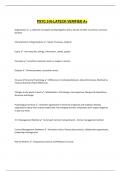PSYC 516-LATECH VERIFIED A+
Organization ✔️a collection of people working together with a division of labor to achieve a common
purpose
Characteristics of Organizations ✔️Inputs, Processes, Outputs
Inputs ✔️raw materials, energy, information, capital, people
Processes ✔️transform materials, teach or support a service
Outputs ✔️Finished product, accessible service
Focuses of Personnel Psychology ✔️Differences in individual behavior, Job performances, Methods to
measure & predict these differences
Changes to the world of work ✔️Globalization, Technology is less expensive, Mergers & Acquisitions,
Structure and Design
Psychological Contract ✔️Unwritten agreement in which the employee and employer develop
expectations about their mutual relationship. Has changed recently--employees don't expect longevity
in jobs any more.
3 C's Management Method ✔️Command, Control, Compartments - former management method
Current Management Emphases ✔️Articulate visions, Democratic practices, Collaborative agreements,
Leadership Contingencies
Role of Workers ✔️Empowered, Diverse, Self-Reliance is Crucial
,Workforce quality determines _________________. ✔️Success
3 Rules of Great Organizations ✔️Selection, Selection, Selection
Challenges to Today's Workplace ✔️Insecurity, Uncertainty, Stress, Social Friction
Benefits to Today's Workplace ✔️Challenge, Creativity, Flexibility, Control, Interrelatedness
5th Amendment ✔️Due Process: "No person shall be deprived of life, liberty of property without due
process of law"
13th Amendment ✔️Involuntary Servitude: "Neither slavery nor involuntary servitude, except as
punishment for a crime, shall exist"
14th Amendment ✔️No state law can supersede a federal law
Federal Law ✔️Congress makes laws, US Supreme Court has final say in regards to interpreting and
applying the law
Certiorari ✔️A writ of _____ is a request to the US Supreme Court to review a lower court decision.
Types of Discrimination ✔️Unequal treatment, Adverse impact
Unequal Treatment ✔️Intention to discriminate
Adverse Impact ✔️Unintentional discrimination due to standards that are applied to everyone yet lead
to substantial differences in employment outcomes for the members of a particular group and are
unrelated to success on a job.
, Civil Rights Acts of 1866 & 1871 ✔️Grants all people in every state the right to make and enforce
contracts, to sue, give evidence, and to the full and equal benefit of all laws enjoyed by white citizens.
FLSA ✔️Fair Labor Standards Act
Fair Labor Standards Act ✔️federal law establishing for most employees: a minimum wage and a 40
hour per week overtime standard.
Who must comply with FLSA? ✔️Companies with two or more employees and companies with gross
sales in excess of 500k.
Exempt Employee ✔️not covered by the provisions of the act. Include professional, administrative,
executive and outside sales jobs. Remember 80/20 rule.
How is FLSA Enforced? ✔️Record keeping requirements, enforced by the Wage and Hour Division of
the US Department of Labor
Equal Pay Act of 1963 ✔️Prohibits sex discrimination in the payment of wages, except where payment
is made pursuant to: Seniority system, merit system, incentive system, any factor other than sex.
Who administers the Equal Pay Act of 1963? ✔️Equal Employment Opportunity Commission (EEOC) as
of 1979.
Civil Rights Act of 1964 ✔️Principle body of fair employment legislation. Divided into several sections
called Titles.
What is Title VII of the Civil Rights Act of 1964? ✔️deals with employment discrimination.
Discrimination in employment is illegal based on sex, race, religion or national origin.
What does Title VII cover? ✔️Public & Private employers, employment agencies, apprenticeship
programs




